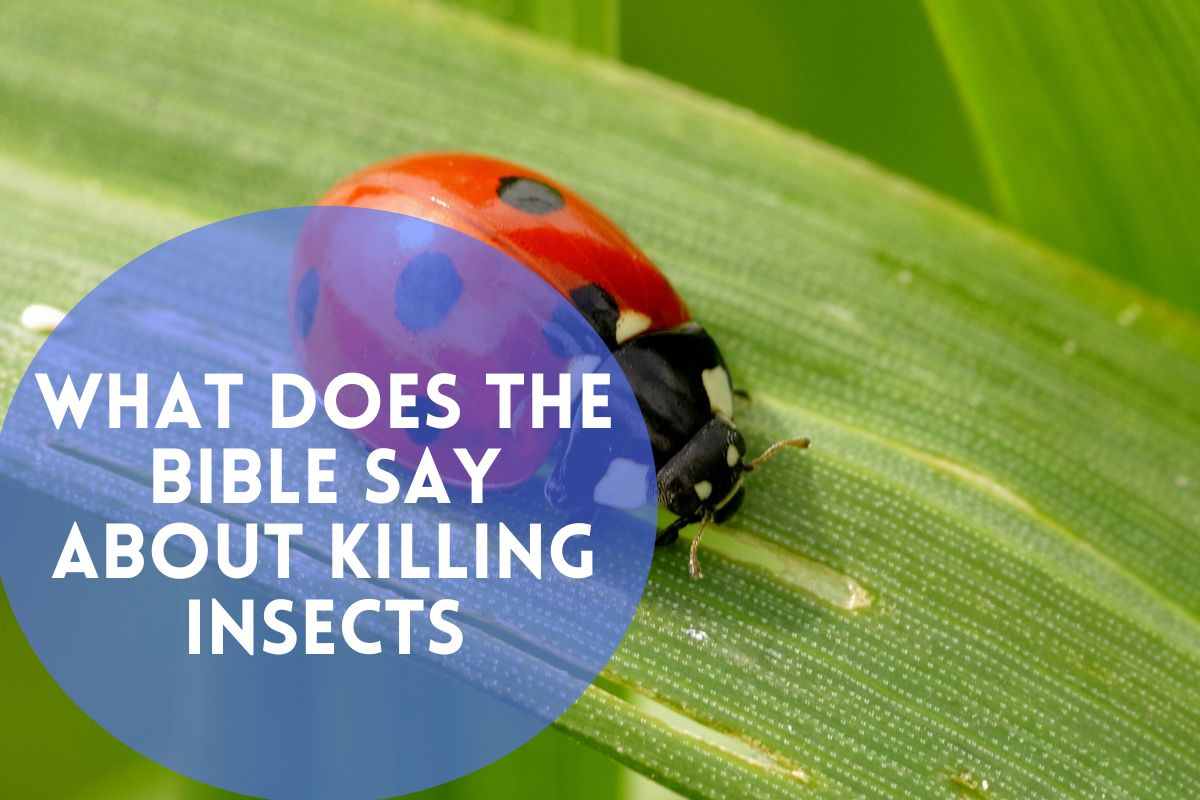The Bible stands as one of the most influential and revered texts in human history, providing guidance, wisdom, and moral teachings to millions around the world. Its verses delve into a wide range of topics, addressing matters of faith, human conduct, and the natural world. Among the myriad subjects discussed within its pages, one may wonder: What does the Bible say about killing insects?
Insects, with their diverse and abundant presence on Earth, have long coexisted with humanity. While they often elicit awe through their fascinating characteristics and ecological roles, they can also be regarded as nuisances or even harmful pests in certain situations. With this in mind, it becomes intriguing to explore the biblical perspective on the ethical dimensions of dealing with these tiny creatures.
What Does The Bible Say About Killing Insects
Understanding biblical perspectives is crucial because the Bible is one of the most influential and revered religious texts in the world. It provides guidance, moral principles, and insights into various aspects of life. By delving into the Bible’s teachings, we can gain wisdom and understanding that can inform our beliefs, actions, and decision-making processes. Therefore, comprehending biblical perspectives on different topics allows us to engage in meaningful discussions, make informed choices, and lead a life aligned with our spiritual beliefs.
Significance of insects in our daily lives and ethical considerations
Insects play a significant role in our daily lives. They inhabit our environment, contribute to ecological balance, pollinate plants, decompose organic matter, and serve as a food source for other organisms. However, ethical considerations arise when it comes to our interactions with insects. Questions may arise regarding the intentional killing of insects, especially when it is not necessary for our survival or protection. Understanding the Bible’s teachings can provide insights into how we should approach these ethical considerations and what principles to consider in our treatment of insects.
Overview of the Bible’s teachings and relevance to the topic
The Bible is a collection of religious texts that includes various genres such as historical accounts, poetry, prophecy, and teachings. It encompasses both the Old Testament and the New Testament, written by different authors over a span of centuries. While the Bible does not specifically address the topic of killing insects comprehensively, it provides broader principles and teachings that can guide our understanding.
Understanding the Context of the Bible
Historical and cultural background of biblical times
To understand the biblical perspectives on various topics, including the treatment of insects, it is essential to consider the historical and cultural context of biblical times. The Bible was written in ancient times, and its stories, laws, and teachings were shaped by the beliefs, practices, and societal norms of those eras. Understanding the cultural milieu of the biblical authors and their intended audience provides valuable insights into their perspectives on life, nature, and morality.
Biblical perspectives on the sanctity of life
The Bible emphasizes the sanctity of life as a foundational principle. Human life is regarded as sacred because humans are created in the image of God (Genesis 1:27). This understanding forms the basis for ethical considerations related to the taking of any life, including that of animals and insects. While the Bible does not explicitly discuss insects’ sanctity of life, it lays the groundwork for valuing and respecting all forms of life, reflecting a broader principle that can inform our approach to insects.
The Dominion Mandate and Stewardship
Exploring the concept of dominion and stewardship in Genesis
In Genesis 1:26-28, the Bible presents the concept of dominion and stewardship. Humanity is given the mandate to have dominion over the earth and all its creatures. This dominion is not a license to exploit or harm creation but rather a responsibility to care for and responsibly manage the natural world. Understanding this mandate helps shape our perspective on our relationship with insects and guides our actions toward them.
Humanity’s responsibility toward the natural world
The Bible teaches that humans have a responsibility to care for and protect the natural world. This includes recognizing the intrinsic value of nature and its inhabitants, including insects. Our treatment of insects should reflect our role as responsible stewards, considering the impact of our actions on their habitats and populations.
Balancing the Preservation of Life with practical considerations
While the Bible emphasizes the sanctity of life and our responsibility as stewards, it also recognizes the practical considerations of human existence. Insects can pose threats to human health, agriculture, and overall well-being. Balancing the preservation of life with practical considerations requires discernment and wisdom. It involves making informed decisions regarding the intentional killing of insects when necessary for self-defense, public health, or protection of essential resources, while also seeking alternatives and minimizing harm whenever possible.
The Bible’s View on Killing Animals
Examining passages that discuss the killing of animals for sustenance
The Bible acknowledges the necessity of killing animals for sustenance. In Genesis 9:3, after the flood, God grants permission for humans to eat the meat of animals: “Every moving thing that lives shall be food for you. And as I gave you the green plants, I give you everything.” This passage establishes the principle of using animals as a source of food. However, this permission also carries the responsibility to treat animals with respect and gratitude for the provision of sustenance they offer.
Provisions for sacrifice and the Old Testament rituals
In the Old Testament, the Bible describes various rituals and sacrifices that involved the killing of animals. These practices were part of the religious ceremonies and sacrificial system prescribed under the Mosaic Law. They served to symbolically atone for sins and demonstrate obedience and devotion to God. While these rituals involved the taking of animal lives, they were specific to the religious context of that time and have evolved in light of Jesus’ teachings in the New Testament.
Jesus’ teachings and the New Testament perspective on animal life
Jesus’ teachings in the New Testament emphasize love, compassion, and care for all of God’s creation. While Jesus did not directly address the killing of animals, his teachings encourage a mindset of kindness and mercy. For instance, Jesus teaches in Matthew 6:26, “Look at the birds of the air: they neither sow nor reap nor gather into barns, and yet your heavenly Father feeds them. Are you not of more value than they?” This highlights the value God places on all living creatures, including animals, and encourages humans to adopt a compassionate and respectful attitude toward them.
The Bible’s View on Insects
Recognizing the biblical references to insects
The Bible references various types of insects in its narratives, including locusts, flies, beetles, and ants. These references often serve to illustrate lessons or convey symbolic meanings within the context of the stories. While insects are not extensively discussed in the Bible, their presence in biblical accounts acknowledges their existence and significance in the natural world.
Understanding their role in biblical narratives and symbolism
Insects are sometimes mentioned in the Bible to convey important spiritual or moral lessons. For example, the book of Proverbs draws lessons from the industriousness and cooperation of ants (Proverbs 6:6-8), highlighting the value of diligence and preparation. Additionally, the plagues of Egypt, which included various insect infestations, served as both judgments and demonstrations of God’s power.
Evaluating biblical teachings regarding the intentional killing of insects
The Bible does not provide explicit guidelines specifically addressing the intentional killing of insects. However, the broader principles of stewardship, compassion, and respect for life can inform our approach. While there may be circumstances where the intentional killing of insects becomes necessary for self-defense, public health, or the protection of essential resources, it is important to approach these situations with mindfulness, seeking alternatives when possible, and minimizing harm.
Compassion and Consideration for All Creatures
Discussing biblical teachings on compassion and kindness towards animals
The Bible contains numerous teachings that emphasize compassion, kindness, and care for all creatures. Proverbs 12:10 states, “The righteous care for the needs of their animals.” This verse highlights the importance of considering the well-being of animals and treating them with compassion. Additionally, passages such as Psalm 145:9 and Jonah 4:11 emphasize God’s mercy and compassion towards all His creations, including animals.
Applying these principles to the treatment of insects
The biblical teachings on compassion and kindness extend to our treatment of insects as well. While insects may be perceived differently due to their small size or potential nuisances, we are still called to exercise care and respect toward them. This means avoiding unnecessary harm or cruelty, considering non-lethal alternatives when possible, and acknowledging their value in the larger ecosystem.
Finding a balance between practical considerations and ethical treatment
When considering the treatment of insects, it is important to strike a balance between practical considerations and ethical treatment. While some insects may pose risks or threats to human well-being, it is crucial to assess these situations and respond with appropriate measures that prioritize safety without unnecessarily causing harm. This might involve utilizing preventive measures, such as pest management strategies, that minimize harm to insects while addressing practical concerns.
Practical Applications and Personal Convictions
Personal interpretation and application of biblical teachings
Interpreting and applying biblical teachings regarding the treatment of insects is a personal journey. Individuals may have different perspectives and convictions based on their understanding of Scripture, their cultural context, and their personal relationship with God. It is essential to study the Bible, seek guidance from trusted spiritual leaders, and prayerfully consider how these teachings should be applied in specific situations.
Considering individual conscience and convictions
Each person has a unique conscience and set of convictions shaped by their understanding of biblical teachings. When it comes to the treatment of insects, individuals should consider their own convictions and the guiding principles of love, compassion, and responsible stewardship. Personal convictions can help inform decisions regarding the intentional killing of insects, ensuring that actions align with one’s deeply held beliefs and values.
Applying biblical principles to modern-day interactions with insects
In applying biblical principles to modern-day interactions with insects, it is important to consider both the practical and ethical aspects. This may involve using non-lethal methods to manage pests, such as employing natural deterrents or implementing environmentally friendly pest control measures. It also involves being mindful of the impact our actions have on the environment and seeking to minimize harm while addressing practical concerns. By integrating biblical principles into our daily lives, we can strive to treat insects with compassion and respect, recognizing their place in the intricate web of life.
Conclusion
In this exploration of the Bible’s teachings on killing insects, we have covered several key points. We began by recognizing the importance of understanding biblical perspectives on various topics and the ethical considerations surrounding the treatment of insects. We then discussed the historical and cultural context of the Bible, as well as its teachings on the sanctity of life, the dominion mandate, and stewardship.
We explored the Bible’s view on killing animals, highlighting passages related to the sustenance of humans and the provisions for sacrifice and rituals in the Old Testament. We also considered Jesus’ teachings and the New Testament perspective on animal life, emphasizing love, compassion, and care.
Regarding insects specifically, we recognized their presence in biblical narratives and symbolism, as well as the limited direct teachings on their intentional killing. We emphasized the need to evaluate biblical teachings within the broader principles of stewardship, compassion, and respect for life.
The topic of the Bible’s perspective on killing insects invites further study and reflection. Delving deeper into biblical passages, seeking additional scholarly insights, and engaging in discussions can enhance our understanding of this complex subject. It is through continued learning and reflection that we can develop a well-rounded understanding of how to approach the treatment of insects in light of our spiritual beliefs.
Throughout this exploration, we have emphasized the importance of responsible stewardship. The Bible calls us to be caretakers of the natural world, demonstrating compassion, respect, and responsible decision-making. This extends to our interactions with insects, as we navigate practical considerations and ethical treatment.






